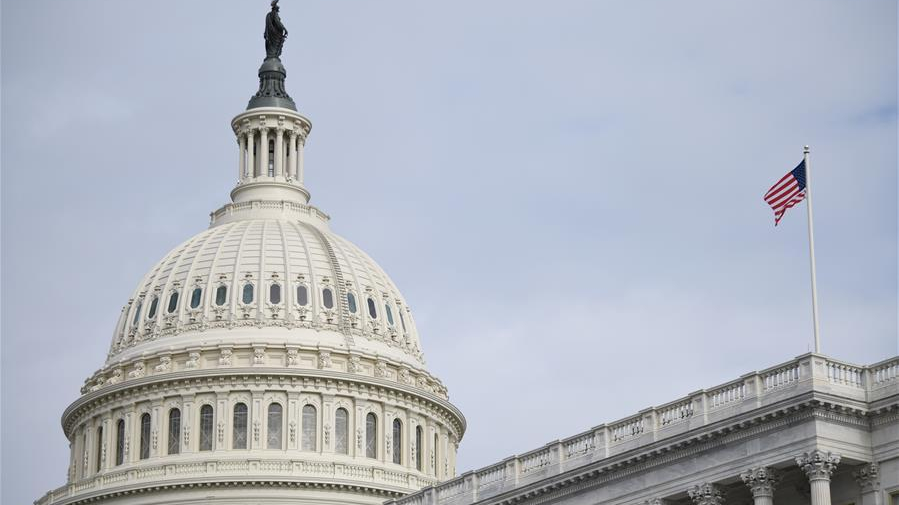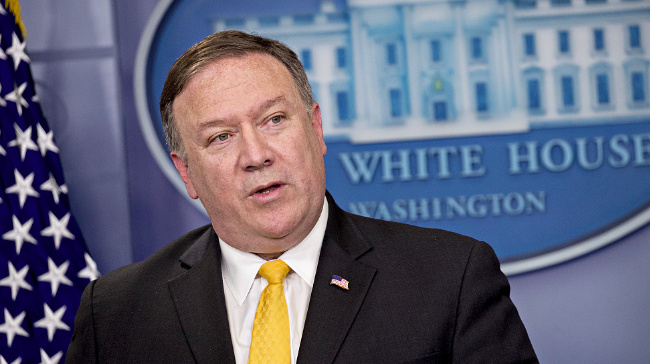
The Capitol Hill in Washington D.C., U.S., December. 4, 2019. /Xinhua
The Capitol Hill in Washington D.C., U.S., December. 4, 2019. /Xinhua
Editor's note: Andrew Korybko is a Moscow-based American political analyst. The article reflects the author's opinions, and not necessarily the views of CGTN.
The official White House Twitter account shared a brief video by Secretary of State Pompeo where America's top diplomat blames China, Russia, and Iran for supposedly spreading "misinformation" about COVID-19. According to him, these three countries are actively working to "undermine" the U.S.' "democracy, freedom, and the way that we're responding to this risk", which he then immediately proceeds to describe as the "Wuhan virus."
This video is nothing more than an unconvincing attempt to distract from America's belated response in properly preparing for COVID-19's inevitable spread to its shores and shift blame for this viral outbreak in general. It's become fashionable in American political society in recent years to blame either one of those three countries, a combination thereof, or all of them anytime something isn't going the way that it should, and the Trump Administration is once again instinctively resorting to its favored information warfare tactic.
There is no evidence that any one of those three countries has anything to do with the vague "misinformation" that Pompeo claims is being disseminated. In fact, he doesn't even describe what he means by "misinformation", with it being up to the viewer to decide what exactly constitutes this term. It's unclear whether questioning the U.S.' preparedness – whether at the federal, state, or local levels – falls within this ambit, but it very well might be in order to intimidate Americans from speaking out about this issue.
America is currently divided over every possible issue in the contemporary hyper-partisan environment preceding the upcoming November elections, and the nation's response to COVID-19 has predictably become one of the most controversial topics in the country. The Trump administration detests criticism of any kind, and it appears as though its top diplomat wants Americans to think that having an opinion about the government's response other than the "official" one is the result of "foreign misinformation"
It's politically convenient for Pompeo to blame China, Russia, and Iran for the fact that some Americans are critical of their government's response to COVID-19 and arguable lack of preparedness for this pandemic despite it having already been a global problem for several months. Ironically, just as Trump has famously accused his political opponents of launching a "witch hunt" against him during his impeachment scandal, so too is his administration now launching the same against its critics by implying that they're under foreign influence.

U.S. Secretary of State Mike Pompeo speaks during a White House press briefing in Washington DC, United States, on June 7, 2018. /VCG Photo
U.S. Secretary of State Mike Pompeo speaks during a White House press briefing in Washington DC, United States, on June 7, 2018. /VCG Photo
Just as alarming, however, is Pompeo's use of the term "Wuhan virus." The secretary of state is playing with a variation of his boss' infamous accusation that China is responsible for this pandemic, ergo why Trump has previously described it as the "Chinese virus". Both of these descriptions are attempts to further politicize this pandemic. It's true that some diseases such as the Middle East Respiratory Syndrome (MERS) are popularly described based on their geographic origin, but their official names are actually different.
MERS, for example, is officially referred to as HCoV-EMC/2012, the same as how what the U.S. government now calls the "Chinese/Wuhan virus" is really COVID-19. The habit of describing viruses based on their geographic origins instead of official scientific names might have initially been innocent enough despite the inadvertent risk of stigmatizing people from those areas, but nowadays there's no excuse for doing so, as in 2015 WHO released a guideline on the best practice to name new human infectious diseases where it states new terms should not involve mentioning geographic locations. By deliberately calling the novel coronavirus "the Chinese virus", the U.S. has clearly weaponized this method for political purposes aimed at damaging China's reputation.
Returning to the lead-in news item that inspired this analysis, the official White House Twitter account sharing Pompeo's provocative video, it becomes increasingly obvious that the U.S. is intensifying its information warfare against China, Russia, and Iran. This deceptive but nevertheless desperate tactic speaks to the pressure that America is coming under both at home and abroad, hence why it's lashing out at its perceived rivals without any basis whatsoever. It's for this reason that Pompeo's information warfare stunt was unconvincing.
(If you want to contribute and have specific expertise, please contact us at opinions@cgtn.com.)